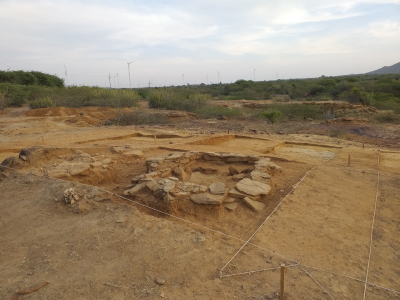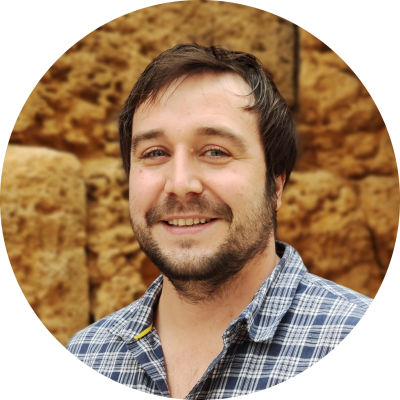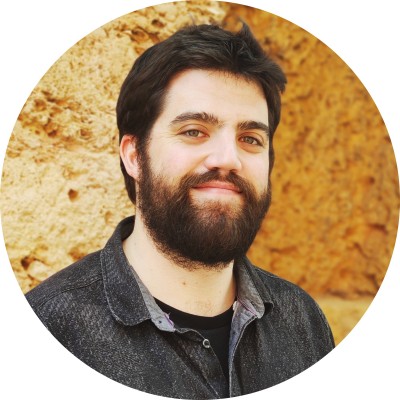
We expand on remote sensing and geoarchaeology! GIAP awarded two more postdoctoral grants
Great news for our remote-sensing and geoarchaeology lines of research! We celebrate that Francesc C. Conesa and Alfredo Mayoral have recently been awarded a Beatriu de Pinós (Generalitat de Catalunya -Catalan government) and a Juan de la Cierva – Incorporación (Ministerio de Ciencia e Innovación -Spanish government) postdoctoral grants respectively.
ArchAI, Beatriu de Pinós (Generalitat de Catalunya), 2022-25

With this project, Conesa will focus on the natural and anthropic relationships that define Cultural Landscapes. This includes critical aspects such as long-term ecological footprint, past land use, and present-day risks, and geohazards that put at risk the visibility and preservation of archaeological sites.
ArchAI will implement a holistic remote sensing and geospatial computational approach to identify, monitor, manage and prevent potential geohazards and human-induced abrupt deterioration processes in heritage sites, such as large-scale looting and illicit landscape transformations.
This proposal tackles UNESCO’ 2030 Agenda for Sustainable Development, with particular emphasis on the cultural challenges “Protecting and preserving cultural heritage” and “Safeguarding traditional knowledge of environmental management” (Resolution 72/229).
Background
Francesc C. Conesa has broad experience in applying and promoting remote sensing and multi-proxy geoarchaeological approaches applied to landscape archaeology. His research focuses on developing new multisource remote sensing procedures, coupled with machine learning and deep learning methods that can help and eventually improve the detection, identification, mapping, and quantification of features of archaeological interest.
Conesa has worked intensively in South Asian archaeological contexts, where he continues to work in the monsoonal plains of north-western India and the drylands of eastern Pakistan. He is currently the PI of the Palarq Foundation-funded Kachchh Archaeological Project: trade, pastoralism and the origins of the Indus Civilisation, in collaboration with the Department of Archaeology, University of Kerala (2020-2023).
He also recently finished a Marie Sklodowska-Curie Individual Fellowship at the McDonald Institute for Archaeological Research, University of Cambridge (2018-2020), which resulted in the detection of hundreds of new archaeological locations related to the Indus Civilisation. His work also includes work in Mongolia, in a project which aims at unraveling nomadic pastoralism in the Bronze Age.
Juan de la Cierva – Incorporación (Ministerio de Ciencia e Innovación), 2022-25

Alfredo Mayoral‘s current research interests concern geomorphology, geoarchaeology, and multi-proxy palaeoenvironmental studies. This includes Late-Holocene landscape evolution and socio-environmental interaction, environmental impacts of (proto-) urbanization processes, and their links to the onset of the Anthropocene.
His recent research in central France has proven that significant anthropogenic impact on soil erosion and wetlands started much earlier than previously thought at the beginning of the Iron Age.
Mayoral‘s current objectives are to expand these topics to new Mediterranean study areas such as Spain or Greece (where he is already participating in projects directed by Dr Hèctor A. Orengo), and to consolidate his re-integration into the Spanish research system after years abroad.
Background
In his six years in a multidisciplinary research team in GEOLAB (UMR 6042 CNRS-Université Clermont Auvergne), Alfredo has become an expert in landscape geoarchaeology, developing an uncommon approach and strong multi-proxy skills in sedimentology, geochemistry, and soil micromorphology. Having carried out his studies and academic career largely abroad, he has developed an international profile as he carried out. As a result of these activities, he has developed a robust research network in France, Greece, and Spain which is gradually expanding to other European countries.
Learn more about his research in France in his recent talk for Musée de Gergovie (Sept. 16, 2021), in which Alfredo presents the results of these latest geoarchaeological and paleoenvironmental works on the Gallic Oppidum of Gergovie, as well as the scientific expectations for the years to come (in French):





